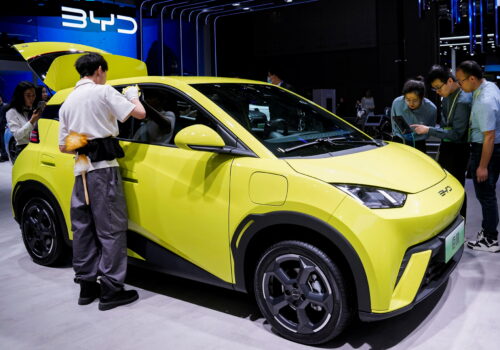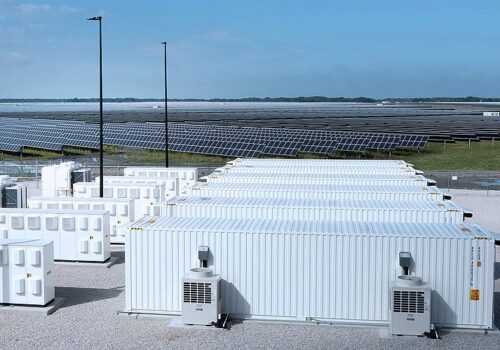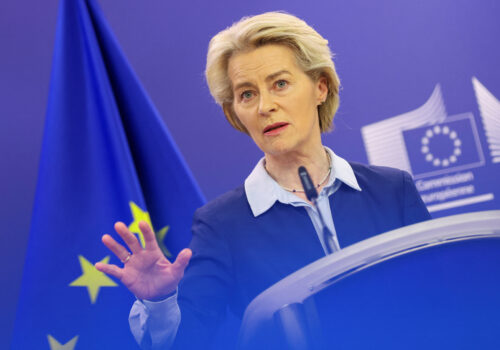Biden’s China tariffs are big and preemptive
What’s new about US President Joe Biden’s far-reaching new tariffs on Chinese goods, announced yesterday, is that they are about both prevention and resignation.
They are about prevention in that the sweeping tariff increases across a range of strategic industries include a whopping 100 percent tariff on electric vehicles (EVs), although these vehicles account for only 1 percent of the US market.
“Fundamentally,” says Josh Lipsky, senior director of the Atlantic Council GeoEconomics Center, “Biden administration officials are trying to avoid repeating the mistakes of past decades, when the United States and its allies did not do enough to counter China’s unfair trade practices until it was too late and Chinese products flooded markets and cost jobs. So this is about the future and not about now.”
The tariffs are also about Biden administration resignation that China isn’t going to converge with the market-driven trade model or adopt fairer trade practices in the foreseeable future.
Biden not only kept all the Trump administration’s tariffs on China, after long months of studying them, but now has added to them as well. That’s intended to counter both direct and indirect harm to US supply chains generated by Beijing’s manufacturing overcapacity.
China has a long history of overproducing and then dumping those products on foreign markets. What is new, however, is that this is now hitting sectors considered critical for US national security. Watch next for US coordination even with countries, such as Brazil, that are generally skeptical of Washington. They have grown concerned about Chinese overcapacity as well.
The new tariffs impact EVs, lithium-ion batteries, semiconductors, solar panels, medical products, aluminum and steel, and more. US officials expect China to respond, but they reckon it will do so in a manner that might only accelerate what the Biden administration hopes to achieve: the de-risking and friendshoring of US supply chains.
“The trillion-dollar question,” says Lipsky, is whether Europe and Japan match or mirror US policies at their Group of Seven (G7) summit this June in Italy. If they don’t, expect Chinese EVs and other products to flood their markets—with Beijing concluding that its problem is primarily with Washington.
Most unfortunate is that both political parties in the United States continue to balk at new trade negotiations and agreements, while China continues to strike trade deals all around the world. That leaves Washington with plenty of sticks but few carrots.
“We’re fighting this battle with one hand tied behind our back,” says David Shullman, senior director of the Atlantic Council’s Global China Hub.
Frederick Kempe is president and chief executive officer of the Atlantic Council. You can follow him on Twitter: @FredKempe.
This edition is part of Frederick Kempe’s Inflection Points Today newsletter, a column of quick-hit insights on a world in transition. To receive this newsletter throughout the week, sign up here.
Further reading
Tue, May 14, 2024
What to know about Biden’s new tariffs on Chinese EVs, solar cells, and more
New Atlanticist By
The Biden administration has imposed new tariffs on imports from China across a range of strategic industries. Atlantic Council experts dig into the details.
Mon, May 13, 2024
What US tariffs on Chinese batteries mean for decarbonization—and Taiwan
EnergySource By Joseph Webster
In response to Beijing’s attempts to cement its dominant position across the “new three” technologies of solar photovoltaics (PVs), electric vehicles (EVs), and batteries, the Biden administration is poised to issue tariffs on key Chinese products. A look at China’s battery exports, and its associated battery complex, reveals both opportunities and risks for US and allied […]
Sun, Apr 7, 2024
Ursula von der Leyen set Europe’s ‘de-risking’ in motion. What’s the status one year later?
New Atlanticist By Jörn Fleck, Josh Lipsky, David O. Shullman
The European Commission president presented a new economic vision for the European Union’s relationship with China in March 2023.
Image: The ''BYD Explorer No. 1'' car carrier is being loaded with new energy vehicles for export at the port of Yantai, Shandong Province, China, on January 10, 2024. (Photo by Costfoto/NurPhoto)


